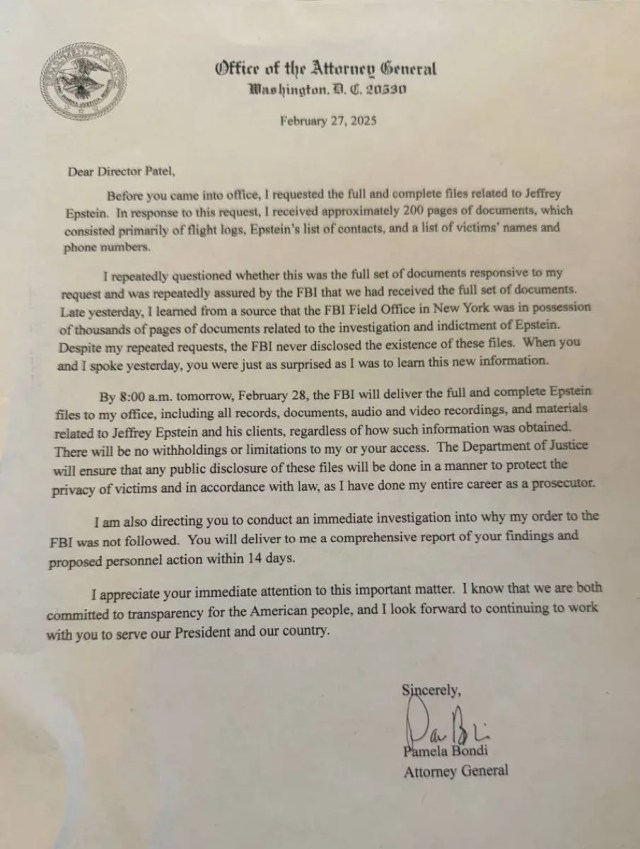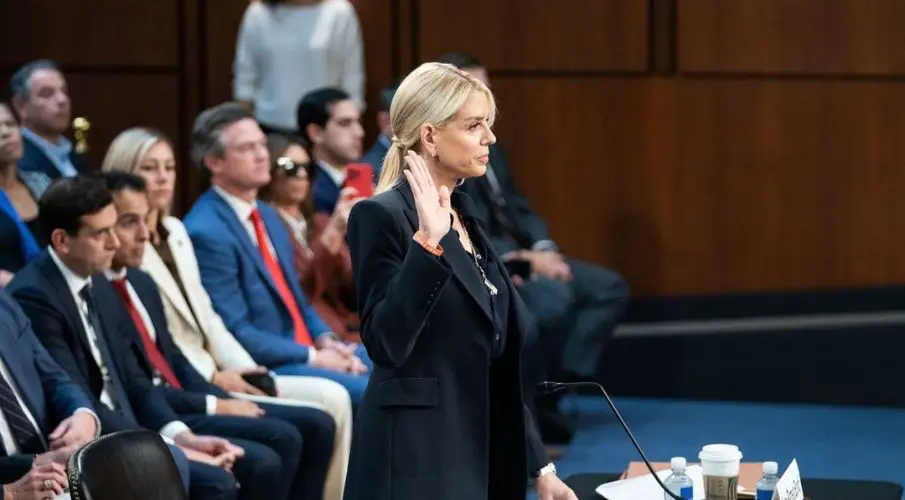October 7, 2025, begins with a promise and ends with a claim. In between lies a hearing in which fewer answers were found than battle lines. Pam Bondi, the Attorney General of the United States, appeared before the Judiciary Committee to refute the accusation that she had turned the Department of Justice into a political weapon. Her defense follows a clear pattern: not she, but her predecessors had "weaponized" the Justice Department; she herself, she said, was merely restoring the rule of law. Yet the facts of this day - and the days before - tell a more complex story, one that only becomes clear when seen in its chronology.
The day before, it had become known that in 2023 the FBI had analyzed the phone records of several Republican lawmakers from the week of January 6, 2021 - not the contents of conversations, but their timing and duration. The measure was part of investigations into attempts to overturn the 2020 election results. It only became politically charged through its late disclosure and the fact that today, of all people, a Trump-appointed attorney general used the weight of that past to her advantage. Bondi seized on the revelation and declared it proof that it was the Justice Department under Joe Biden that had truly politicized law enforcement. With that, she set the tone for what was to follow: not defense, but counterattack.
In the hearing itself, Bondi's strategy revealed itself early. In her opening remarks, she painted a picture of continuity in the state's core tasks - combating violent crime and drug trafficking - and contrasted it with the claim that she had ended the "weaponization of justice." The message was simple, memorable, politically effective. But the more specific the questions became, the more apparent it was how much this narrative depended on gaps and reinterpretations.
Bondi did not falter before Senate Majority Leader Dick Durbin - she pushed back. Repeatedly, and with a raised voice, she shifted the debate to side issues: murder rates in Chicago, Democratic responsibility for the government shutdown. These rhetorical diversions achieved two effects: they avoided revealing her own use of discretion, and they shifted the axis of discussion from institutional scrutiny to partisan blame. At the very moment when the question was whether decisions within the Department of Justice were politically motivated, the conversation turned instead to crime statistics and budget disputes.
Senator Amy Klobuchar reminded Bondi of her pledge from her January confirmation hearing: not to politicize the Justice Department. When asked how this promise aligned with the recent dismissals of career prosecutors and attorneys, Bondi refused to answer - she would not comment on personnel matters. But her refusal did not go without comment: her people, she said, were working without pay because "the other party" had shut down the government. Once again, she shifted responsibility - from her own department to Congress, from decisions to circumstances.
Another sensitive point: the question of whether the Justice Department had flagged investigative files related to the Jeffrey Epstein case for possible mentions of Donald Trump. Dick Durbin asked, Bondi blocked - "I'm not going to discuss that." It thus remains unclear whether such a review took place, by what criteria it would have been conducted, or whether it was deliberately avoided. What is clear is that the leadership of the Department of Justice is keeping the public in the dark at this point.
Of course, we can give it a little push.

Office of the Attorney General
Washington, D.C. 20530February 27, 2025
Dear Director Patel,
Before you came into office, I requested the full and complete files related to Jeffrey Epstein. In response to this request, I received approximately 200 pages of documents, which consisted primarily of flight logs, Epstein’s list of contacts, and a list of victims’ names and phone numbers.
I repeatedly questioned whether this was the full set of documents responsive to my request and was repeatedly assured by the FBI that we had received the full set of documents. Late yesterday, I learned from a source that the FBI Field Office in New York was in possession of thousands of pages of documents related to the investigation and indictment of Epstein. Despite my repeated requests, the FBI never disclosed the existence of these files. When you and I spoke yesterday, you were just as surprised as I was to learn this new information.
By 8:00 a.m. tomorrow, February 28, the FBI will deliver the full and complete Epstein files to my office, including all records, documents, audio and video recordings, and materials related to Jeffrey Epstein and his clients, regardless of how such information was obtained. There will be no withholdings or limitations to my or your access. The Department of Justice will ensure that any public disclosure of these files will be done in a manner to protect the privacy of victims and in accordance with law, as I have done my entire career as a prosecutor.
I am also directing you to conduct an immediate investigation into why my order to the FBI was not followed. You will deliver to me a comprehensive report of your findings and proposed personnel action within 14 days.
I appreciate your immediate attention to this important matter. I know that we are both committed to transparency for the American people, and I look forward to continuing to work with you to serve our President and our country.
Sincerely,
Pamela Bondi
Attorney General
Hovering over all the exchanges of the session was the indictment of James Comey. It is no side note but the political breaking point of this moment. A week old, it casts a double shadow: legally thin, politically heavy. The indictment of a declared opponent of the president can be justified formally by statute, but politically it can only be understood in light of a presidency that for months has demanded criminal prosecution of its adversaries. Bondi insists she has kept her pledge of neutrality - and at the same time ended the "weaponization" of justice. Yet the more often she says it, the more the unanswered central question comes into focus: by what criteria, equally applied to all, are resources allocated, investigations advanced, and personnel decisions made?
Senator Chris Coons wanted to know on what legal basis the White House had ordered the recent military strikes on Venezuelan boats that President Trump described as suspected drug transports. But Pam Bondi refused to answer. "I will not discuss any legal advice that my department may or may not have provided to the president," she said. What this terse refusal triggered in that moment is more than a legal irritation - it is a glimpse into the abyss between power and law. When the nation’s top law officer will not disclose whether deadly force was justified by a congressional mandate, international maritime law, or a secret presidential decree, the axis of the rule of law shifts dangerously close to arbitrariness. The sentence sounds technical, almost banal, yet in its silence lies a tectonic shift: the monopoly on force becomes an executive privilege, the principle of accountability a classified file. Coons’s reminder that due process is the cornerstone of the Constitution feels in this context like a final attempt to draw a red line that is already beginning to fade. For when military violence beyond judicial control becomes routine, even the law itself loses its footing. And where the law loses its footing, power begins to sustain itself.
Video excerpts from Bondi’s testimony - especially her refusal to disclose the legal basis for the deadly attacks on Venezuelan boats - are already on their way to the Inter-American Court of Human Rights in San José, Costa Rica. There, it is being examined whether the operation against alleged drug traffickers in international waters constitutes a violation of humanitarian law and the right to life. Should the court accept the case, it would mark the first time in decades that the actions of a U.S. administration on the high seas are investigated under human rights law.
Those who follow the chronology strictly can see a red thread that needs no speculation. First, there is the late revelation of a court-authorized metadata analysis carried out in 2023, which Bondi presents as an inherited sin of her predecessors. Then comes the fresh indictment of a prominent Trump opponent, fueling the perception of political selectivity. This is followed by a hearing in which the attorney general formally promises transparency but in practice refuses to answer core questions - on dismissals, file reviews, and criteria - while responding instead with partisan blame. The result is not a coherent argument but a clear pattern: control is promised, accountability denied; depoliticization is proclaimed, while political messaging dominates.
Precisely because Bondi invokes the “core mission” of justice at the start of her testimony, the gap becomes so glaring. An apolitical justice system is not defined by the volume of its assurances but by verifiable standards: documented guidelines for discretion, consistent application, transparent personnel decisions, clear boundaries between political communication and judicial action. On this day, all of that remained underexposed. Instead, she relied on powerful slogans that framed dissent as attack and turned detailed questions into trivialities.
The political gain of this appearance lies in the headline - “Bondi rejects accusations of politicization” - not in substance. The institutional loss, on the other hand, is the inverse: the less comprehensible her decisions appear, the stronger the suspicion that loyalty and political usefulness outweigh equality before the law. That is not merely an image problem. It is a stress test for public trust in the core function of the department: to apply the law without regard to person.
The truth of this day consists of sober components, not assertions: an earlier, now public FBI investigative measure that Bondi weaponized; a recent indictment with high political weight; a hearing in which concrete answers were withheld and political framing maximized; and an attorney general who professes independence while leaving the question of verifiable standards unanswered. Nothing more is needed to understand why this session generated more doubt than clarity.

What remains? The rule of law depends on procedures that can withstand political stress. When an attorney general claims to disarm a politicized justice system, she must provide exactly what was missing today: solid transparency on personnel matters, clear criteria for investigations, and traceable boundaries between political messaging and the judicial actions of the White House. As long as those standards are absent, the suspicion remains not only politically useful for the opposition - it is rationally justified. Pam Bondi fulfilled her political task that day: she closed ranks, attacked the opposition, and set the narrative. The institutional task - building trust through verifiable procedures - remains undone. That is the measure by which the truth of her claims will be tested. Not by the volume of her words, but by the visibility of her standards. In the end, she prepared the beginning of her own downfall - out of a loyalty she gives, but will never receive.
Investigative journalism requires courage, conviction – and your support.
Please also strengthen our journalistic fight against right-wing populism and human rights violations. We do not want to finance ourselves through a paywall so that everyone can read our research – regardless of income or origin. Thank you very much!


Danke für diese ausführliche Recherche.
Wiederholung von Narrativen, Abladen der Schuld auf „die anderen“, Ablenken mit Nebenschauplätzen, konkrete Weigerung zur Offenlegung.
All das mit Trumps Segen, nein eigentlich mit seiner Erwartung.
Aber was ist die Konsequenz?
Es wird nichts passieren, solange Bondi Trump nützlich ist.
Egal was alles schief läuft.
Letztlich war die Anhörung Makulatur.
Interessant könnten solche Aufzeichnunhen nur werden, wenn die Trump Schergen allesamt abgesetzt wären und sich, analog zum Nürnberger Prozess, für ihre Gräueltaten verantworten müssten.
…auf die rollt noch ein verfahren, bzw läuft, vor der juristenkammer in florida, das wird spannend